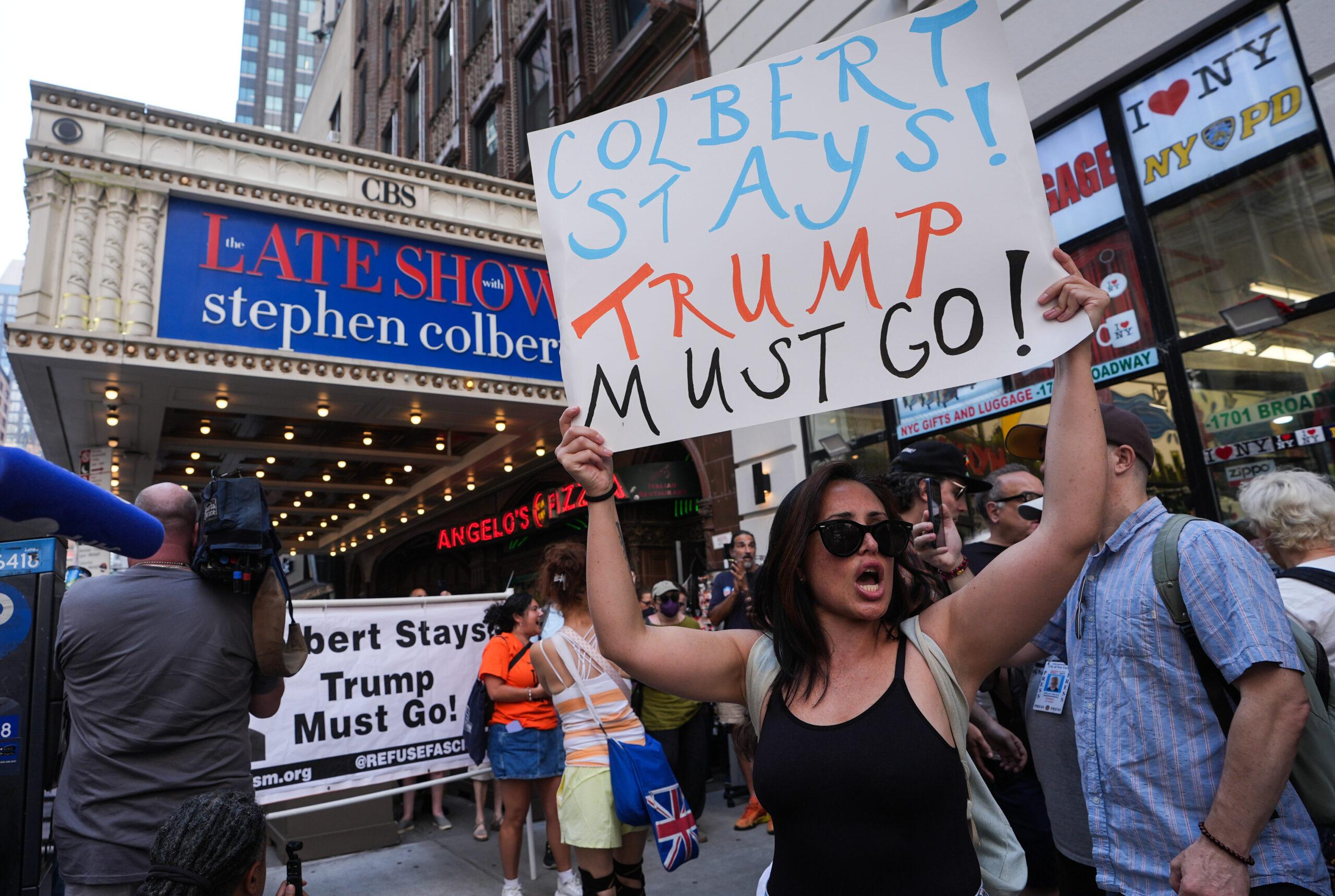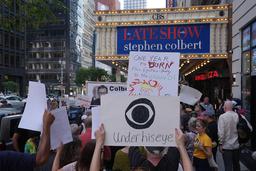
Hosts
About the episode
Even before the cancellation of The Late Show With Stephen Colbert, the business of comedy was changing rapidly. Twenty years ago, comedians aspired to be late-night hosts, or to star in movies, or to have their own sitcoms. But in 2025, late-night shows are going extinct, adult comedies in Hollywood are a thing of the past, and popular sitcoms are so rare these days that Gen Z viewers are still watching The Office and Friends. Instead, many comedians rightly recognize that they can make more money as solo acts. In comedy, as in much of our culture, the age of institutions is giving way to an age of individuals talking to individuals.
Lucas Shaw, a reporter for Bloomberg and frequent commentator on the Town podcast, joins the show to talk about the cancellation of The Late Show With Stephen Colbert and what it says about the history and the future of comedy and media. We also talk about the death of adult comedies, the retreat of sitcoms on TV, why comedy as a field is becoming more of a solo business, and what that says about entertainment culture more broadly.
If you have questions, observations, or ideas for future episodes, email us at PlainEnglish@Spotify.com.
Host: Derek Thompson
Guest: Lucas Shaw
Producer: Devon Baroldi
Summary
In the following excerpt, Derek and Lucas Shaw examine the three main theories for why The Late Show With Stephen Colbert was canceled and determine which is the most plausible.
Derek Thompson: So I wanted to bring you on because I’m really interested in the cancellation of The Late Show in terms of what it says about television and comedy and, really, more broadly, media and entertainment. And it seems to me like the interpretations for the cancellation of this show really broke down into three categories.
Number one, this was political: CBS did it to genuflect to the president as they’re looking forward to prepare for this merger. Number two, it happened because Colbert isn’t very funny as the host of The Late Show. Conservatives, I think, prefer at this point [the idea] that the show got woke, and this is yet another case of “go woke, go broke.” And then number three, that I’m mostly predisposed to believe, is that this isn’t about politics. It’s not about cultural comedy. It’s about economics. This was a very expensive show. It cost too much money, and CBS, heading into this merger, wanted to save money. Who or what do you think killed The Late Show?
Lucas Shaw: So we’ll just dispel with the second one first because get it out of the way. The “go woke, go broke” thing makes no sense here. It was the highest rated of the late-night shows. We can get into particulars around social views and all of that, but that really has nothing to do with it. Comedy is a matter of taste, but people at CBS are very proud of the show. The show gets nominated for awards all the time. Stephen Colbert is objectively a talented comedian, whether you like him or not.
Anyways. I think the economic rationale is indisputable. The ratings for late night have gone down pretty much every year. His show has held up better than some, in part because the audience is so old. But you think about from when he started to now, it’s lost at least a third of its audience. When he started, the audience for late night was already much smaller than it was. The cost doesn’t really go down because he is a highly paid talent. He gets paid about $20 million a year. They have a lot of people working on it: There’s a band, there’s lots of writers, producers. All told, about 200 people. Whether we’re going to fully accept the numbers that people are putting out there, $40 million in losses this year, $50 million in losses next year, that’s what people are saying, so I have to go with it. There could be some classic Hollywood accounting in it, but there’s no way that that … It’s not a profitable show, and it’s not a growing show, and so it does make sense to want to cancel it for that reason.
At the same time, it is almost impossible for CBS to get the benefit of the doubt right now given everything else that has happened around the Paramount merger with Skydance, from settling what everyone considered a frivolous lawsuit with Donald Trump to everything that is coming out around David Ellison’s meetings with the chair of the FCC and the promises they’re making. There are all sorts of compromises and changes that are being made to satisfy the Trump administration, get this deal done. And so even if politics had nothing to do with this decision, people don’t believe them when they say it.
Thompson: I want to present not a conspiracy, but maybe a little half conspiracy when it comes to the politics here. Media companies are absolutely sucking up to Trump. I mean, that’s not a matter of opinion. That’s a matter of fact. Amazon buying the Melania doc, Disney paying $15 million to Donald Trump to resolve the lawsuit over comments made by George Stephanopoulos. The president is absolutely using the power of the office to elicit payments and promises from media firms.
Sometimes the threat of extortion can be convenient for companies, right? Companies sometimes like to have cover for cost cutting. I remember during the Great Recession, it was practically a meme that big companies would hire McKinsey to do a strategic evaluation of, let’s say, Condé Nast. And then McKinsey comes in, and they look at the company, and they’re like, “Hey, we’re McKinsey. We’re really smart consultants. We think you should cut 10 percent of your workforce.” And the head of Condé Nast is like, “Oh, lo and behold, it turns out I have to cut 10 percent of my workforce because McKinsey told me to.”
Shaw: Sure. Or during the pandemic, when people used that as an excuse to make all sorts of changes to their business, some of which were completely legitimate and some of which were manufactured.
Thompson: Precisely. And if Paramount wanted to make certain cuts to improve their profitability, or just to make the company more ideologically, culturally in line with the new owners, and oh, those cuts just happen to appease a president who we know is litigious and thin-skinned, well, then you have a situation where the motivation of the cuts is, to your point, maybe 90 percent economic. But the appearance of the cuts, if it turns out that those are 90 percent political, well, that’s just fine. It’s fine if the cuts seem political because it’s nice to have that cover, that overlay, that excuse.
How do you feel about my half conspiracy that CBS is allowing the political crackle to exist because it’s kind of a nice way to ensure that the president and a political FCC are going to approve a forthcoming merger?
Shaw: It is a very fun contrarian theory. The problem with it, I guess, is in the case of the recession, in the pandemic, and some of these other sort of exogenous political circumstances, usually, they are convenient excuses for doing difficult things to try to soften the blow when you announce that you’re doing it. In this case, it’s sort of the opposite, where because fans of Colbert are by and large not fans of Donald Trump, if you’re using kowtowing to the … I mean, and they’re obviously not. They’ve explicitly said it’s not a political decision. But if you are sort of covertly helping to create this perception that you’re doing it for Trump, it doesn’t help you or benefit you in any way. It just alienates the Colbert viewers. So I don’t know how they gain from that.




